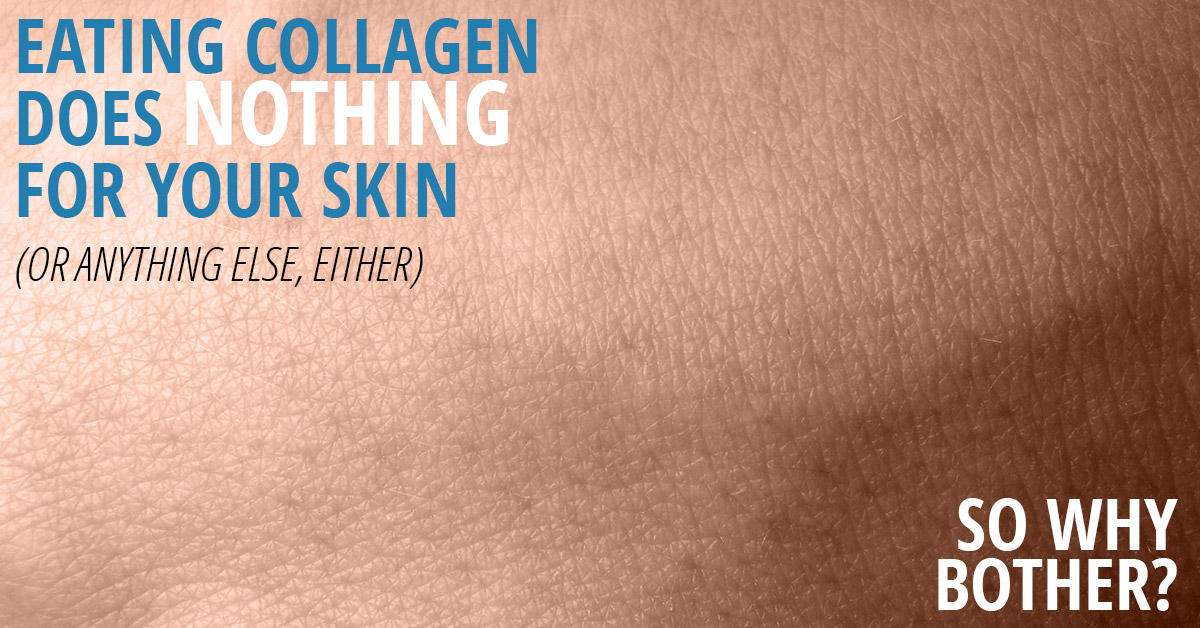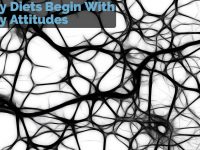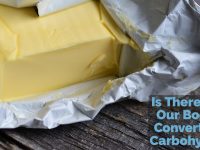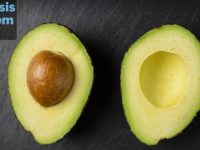Awhile back when I was in Taiwan visiting a friend, his then girlfriend (now wife) took us to a little restaurant and ordered a small feast. One after another, the dishes arrived at our table, and were mostly fabulous. A less fabulous dish, however, was the pile of gelatinous, cooked fish skin adorned with colorful roe “sprinkles”.
While it was not necessarily disgusting, it’s also a dish I would never order again as it was neither particularly tasty or nutritious. For my friend’s girlfriend, on the hand, it was a staple health food. She explained that fish skin is rich in collagen and would be good for my skin—which is not an uncommon belief surrounding collagen (just look at all the skin products that contain it!). All skin is chock-full of collagen, so surely eating a diet rich in collagen is a great idea!
Alas, that’s just not the case. Collagen—whether eaten or applied topically—is completely worthless.
There’s No Good Science to Support Dietary Collagen Doing Anything
At least, there’s no good science to support dietary collagen doing anything more or better than any other higher-quality (not to mentioned cheaper and better tasting) protein would. At its core, collagen is just a (very) low-quality protein—it has few amino acids and extremely low essential amino acid content—and low-quality proteins are universally inferior in terms of benefits to high quality proteins.
It’s hard to link to a good study here because… well… because there really aren’t any good studies, at least not that I could find—every study I saw compared supplemental collagen intake to a control of no treatment. This may seem like good study design, but that’s like comparing the safety of a new belay device to belaying without a device. Of course we should expect to see a greater than nothing improvement when even a poor quality protein is added to an otherwise normal diet; the real question is what would happen if you compared the addition of equivalent amounts of high-quality protein vs. dietary collagen.
This is actually a common tactic in nutrition (and pharmacology)—new supplements, treatments, drugs etc. are compared to nothing instead of the current best practice or an otherwise reasonable control. High-fat diets are compared to high-carbohydrate diets without controlling for protein intake, and new drugs coming to the market are compared to placebos instead of currently available drugs. In such cases, it’s easy to make something look good because most interventions are at least better than nothing. But, in the real world, we already know that a higher protein diet significantly speeds along collagen formation in wound healing, so the bar isn’t nothing but rather a high-protein diet.
So when studies like this one come around that appear to show a benefit to collagen supplements, you have to wonder why they didn’t use a real control (especially when protein, by itself, was shown to be of significant benefit in the exact same condition over a decade earlier!). Likely as not, because they knew it show how much of a sham collagen protein really is.
There’s No Rationale As to Why Collagen Could Work
As mentioned a moment ago, collagen is just a low-quality protein; it’s almost completely formed of only three amino acids: glycine, proline, and hydroxyproline. None of these amino acids are even essential—our body can make every single one out of other dietary amino acids. A high-quality protein will have a PDCAAS score of at least 70, and often 90-100 (the maximum) for the greatest quality proteins. Collagen has a paltry score of about 14-16. Hmm.
Furthermore, collagen’s lack of essential amino acids (and most importantly leucine) means that it’s unlikely your body would even use the amino acids it got except as fuel unless it was consumed in conjunction with a higher quality protein. This is because protein synthesis must be “turned on”, which in large part relies on the presence of leucine. Less leucine means less activation of protein synthesis, which means less collagen synthesis. That’s not very promising!
We can dive even deeper, though. One reason why collagen is often touted is because of its exceptionally high content of a specialized amino acid called “hydroxyproline”. Hydroxyproline is just a hydroxylated version of proline—it’s had a hydroxyl group (-OH) tacked on—and it’s one of the reasons collagen can twist into such a tight helix. This helix is important because collagen by itself is pretty weak, much like a single strand in a twisted rope is weak. Weave three strands together, however, and everything gets much stronger.
The pro-collagen logic goes that getting extra dietary hydroxyproline will increase the availability of internal hydroxyproline in the formation of new collagen—but it doesn’t work that way! Hydroxyproline is never actually incorporated itself into collagen, regular old proline is. It only becomes hydroxyproline during a later stage, when some of those prolines get hydroxylated to help form that twist. And of course it should be this way: it’s much easier to twist straight strands together than ones that have already been twisted into helices.
So getting more hydroxyproline from your diet isn’t going to help a single iota because your body can’t use pre-hydroxylated prolines in the formation of new collagen. Once “twisted”, it’ll never be useful again until untwisted, which is something that doesn’t appear to happen in any measurable amount in the human body.
Bonus Topic: Topical Collagen Is Worthless, Too!
I don’t write about skincare and beauty products often (actually, this is the first time to my recollection), but since we’re on the subject I’ll take a stab at it. Collagen, no matter how fancy a company makes it sound, cannot be applied topically and be expected to work.
The simple reason is that it cannot penetrate your skin. There’s a reason we put food into our mouth and don’t just smear it on our skin, which is because our skin is (by-and-large) an impervious barrier. If we could absorb complex molecules through our skin, it wouldn’t be doing a very good job—and we’d always be ambiently absorbing protein into our body by way of bacterial activity on the skin!
Even if we could somehow absorb collagen, though, bigger questions still remain. For example, how would our skin actually use that ready-made collagen when it usually builds it from scratch? How would it know which parts to deliver the preformed collagen to when usually the cells that need it synthesize it form themselves? I have no idea; I suspect the skincare industry doesn’t either.
It’s Called “Sympathetic Magic”
The idea that dietary collagen is good for bodily collagen is just another form of sympathetic magic. Sympathetic magic is the belief that “like influences like”—for example, that foods that resemble genitalia are good for sex, or that you can influence your luck by being good (e.g., “instant karma”).
Needless to say, there’s no scientific basic for sympathetic magic; it’s just another mode of thought that doesn’t rely on scientific testing or observation. You can’t get healthier skin by eating fish skin, and you can’t grow stronger tendons by eating cow tendons (and ears, hooves, skin, and bones—the normal ingredients in collagen-based proteins).
Avoid Collagen, Just Eat Good Proteins
The bottom line is avoid collagen-based proteins, unless you’re making gelatin; they’re worthless as far as collagen synthesis goes. If anything is going to work, it’s going to be a high-quality protein—the same as you’d want were your goal any other type of protein synthesis.
Really, this should be good news, because collagen-based proteins are A) expensive and B) kinda gross. It’s exciting that you don’t need to subject yourself to a weird food to get the same (or rather, more) benefits—you can get them all from a simple steak, or a protein shake, or a serving of beans! That’s way simpler, cheaper, and tastier.
Of course, if your goals aren’t healthy skin but rather not being a fussy Westerner, then you’ll probably still be eating that fish skin—yum.
Update 6/26/19
I’ve written a new article on this topic with some updated information and perspectives based on new research that has come out. If you’re curious, you’ll find it here.
https://www.climbingnutrition.com/diet/an-update-on-dietary-collagen-protein/















I generally don’t get swayed by stuff like eating collagen for joint/skin health, but I have to admit I tried this one. As a climber and a scientist/engineer, I had some pain in my finger joints and did some research first. I found articles like this: https://www.ncbi.nlm.nih.gov/pubmed/18416885 that showed some potential benefit to collagen for joint pain reduction and articles like this: http://pubs.acs.org/doi/abs/10.1021/jf050206p that showed that the collagen wasn’t broken all the way to monopeptieds, but persisted as di- and tri- peptieds in the blood. So, maybe it’d work better than some other protein source… and if it didn’t, I’d only be out $10-$20 worth of crappy protein.
Admitting the problems with “try it and see” diet changes (I liked your recent article on that, by the way), started taking collagen supplements. The results? A big old nothing. After two months of the stuff, I stopped because the pain level and range of motion wasn’t getting better. So, my n=1 experiment verifies your article, for what that’s worth. As for the painful joints, those are much better now… probably due to stretching and intelligent use of rest, athletic tape, and discretion while climbing.
Thank you for the wonderful, well reasoned, evidence based posts.
I am not an expert in this subject. I’ve read elsewhere that our digestive tract transforms most of the foods we eat into something else. That being said however, and the ‘conventional science’ aside, there are thousands of people that swear that ingesting collagen tablets helped their skin look younger and joints pain disappear. (see here https://au.iherb.com/pr/Neocell-Super-Collagen-C-Type-1-3-6-000-mg-250-Tablets/16589 and here: https://www.amazon.com/Hydrolyzed-Collagen-Peptides-Dietary-Supplement/dp/B00XQ2XGAA/ref=sr_1_3_a_it?ie=UTF8&qid=1517049707&sr=8-3&keywords=collagen)
So where is the truth? We believe we know how our body functions, but do we really?
Are all these people that say taking collagen helped them, delusional?
I would never call anyone delusional for believing collagen (or any other supplement) works for them; however, there are numerous reasons why our brain might come to an erroneous conclusion in regards to what “works”, so when I (and other scientists) attempt to determine the efficacy of something we try to rely on properly controlled data. In the case of collagen, there’s no compelling scientific evidence that it does really do something—or at least that it does something different or better than any other dietary protein—so I recommend against it. Perhaps future evidence will suggest otherwise, but based on the biochemistry of protein digestion, absorption, and utilization, it seems likely that any protein source will have a similar effect on human collagen production.
First, how old are you? If you are past 40, you are not going to make enough collagen even if your total protein is adequate. When you see old people who are not fat, you are generally seeing people with poor maintenance of collagen. When your collagen is not being repaired and replaced properly, movement makes you conscious of your skeleton which rattles a little where bones meet, and there is a feeling of “skin and bones”. Even lung function is affected because so much of these organs are collagen. When collagen is being adequately maintained, no such sensations are noticeable, and not only are skin and hair better, one’s face fills out under the skin better, so you look less ancient when you look in the mirror.
The author and some of the commentators refer to themselves as scientists, and yes, scientists read the literature on a subject and try to draw conclusions. But a real scientist would get some bulk unflavored gelatin and find a way to incorporate half a tablespoon in each meal for a while in order to actually see if there is any noticeable difference when one supplements hydrolyzed collagen. You don’t need particle colliders and an expensive team of experts to figure out what happens. If you were really sharp, you would also control total protein to understand better the dietary collagen requirements of a top predator. Herbivores don’t eat collagen, you know, so these species will better conserve robust synthesis of collagen in the face of evolutionary pressure.
Also, you cannot study protein function without taking into consideration that insulin resistance messes up collagen synthesis. If you are insulin resistant, taking hydrolyzed collagen is just going to raise your fasting blood sugar even higher, while making only a minimal contribution to collagen synthesis.
I completely agree that a particle collider would be irrelevant in studying collagen metabolism, but all scientific study benefits from basic practices of blinding and placebo-controlling, both of which are absent in your proposed experiment of taking half a tablespoon in each meal. I’m willing to listen to evidence as it’s presented, but currently the evidence suggests that dietary collagen has no significant effect on our body. Biochemically, this isn’t surprising; our body degrades any protein or polypeptide into its constituent amino acids primarily with a small amount of di- and tripeptides. These amino acids have the same effect regardless of where they come from, whether it’s muscle tissue, collagen, legumes, or (in the case of animals like ruminants) grass.
Hey Brian,
So what are you thoughts about Keith Baar or G. Shaw studies (https://www.ncbi.nlm.nih.gov/m/pubmed/27852613/?fbclid=IwAR2s3Lcrwnx1Wa6EADrk15LmzUVNb-slfkFJ4UTCziBzyIEfNTd1VrAksGE) or even about the article of your ClimbSci mate, Tom Herbert (http://useful.coach/articles/nutrition-for-soft-tissue-training-recovery-and-injury-prevention/) ?
I’m getting a bit lost around the floating contradictory informations… !
I think the Baar & Shaw study forwards our knowledge of collagen synthesis, but still doesn’t provide a convincing argument for why dietary collagen would be better than any other protein (preferably a high-quality protein). Their protocol is interesting, and perhaps it suggests that nutrient timing for collagen hypertrophy is different than for muscle hypertrophy relating to how nutrients reach the tissue in question (since collagen is predominantly avascular, it would possibly benefit from mechanical aid in the form of contracting and stretching). But, the study still only compares collagen to a maltodextrin (carbohydrate) control, and we wouldn’t expect such a control to have any effect on our connective tissue! On the other hand, it’s fully possible a high-quality protein would have an equivalent or greater effect on collagen synthesis, we just haven’t done any studies to compare the two.
My personal feeling, based on what we’ve repeatedly seen in nutrition studies, is that directed amino acid targeting is never as effective as simply supplying the whole retinue of amino acids in biologically normal amounts. BCAAs aren’t as effective as a whole protein, even though we can individually look at how leucine triggers muscle protein synthesis and see a large response. Arginine and citrulline, both players in the formation of nitric oxide, also both fail to improve nitric oxide production in an actual human body. All these amino acids once held promise because we were able to identify them as key components of this or that biochemical process, but the processes ended up relying on more than a super-dose of those amino acids. I can’t say for certain since we don’t have the data yet, but my suspicion is that the same will prove true of glycine and proline in terms of collagen synthesis.
There is a lot of contradictory evidence out there, and a big part of the reason why is because nobody (me or anyone else) has enough reliable data to make a conclusive argument. Instead, we’re all looking at the data and drawing different conclusions based on what we think will happen. I tend to be pessimistic or skeptical because I know that most “big things” in the world of nutrition haven’t panned out, but that doesn’t mean this one won’t, and ten years from now I could have a different opinion. Either way, for the time being I would keep in mind that regardless of what anyone says, we don’t have strong data yet—we have a small handful of studies, none of which have compared collagen to a realistic alternative treatment (i.e., protein). So, even if you do decide to take dietary collagen, I would remain open to new information.
Any thoughts on Eric Horst’s product Physivantage Collagen? https://physivantage.com/products/supercharged-collagen
He points to some recent research and sure does talk alot on his podcast on how this is different than other products out there. Still smells a bit fishy to me.
Would appreiciate your opinion on it.
The recent research basically shows that amino acids from dietary collagen are used for collagen protein synthesis by the body when dietary collagen is consumed prior to exercise. It’s an interesting line of research because we still don’t really know how collagen protein synthesis is triggered (at least not as well as muscle protein synthesis), but I think it still falls short of convincing proof that dietary collagen is worthwhile. The main problem—and not a new problem, but the same problem I see in literally every study on dietary collagen—is that the authors compared dietary collagen (and vitamin C) to maltodextrin, a carbohydrate. Collagen is a protein and composed of amino acids, and as such I would expect it to have at least some effect on physiological protein synthesis whether collagen, muscle, or globular (or whatever) compared to a no protein control. In real life, though, we’re not choosing between collagen protein and no protein, though—we’re choosing between collagen and another protein. It could be that large doses of the specific amino acids found in collagen (the majority of which are unessential) do selectively increase collagen protein synthesis compared to any other protein source, but there’s no study to suggest this yet and so I maintain in the meantime that simply getting adequate protein from high-quality sources is as good or better.
I hope that helps!
It does! Thanks Brian!
I’ve been supplementing with high-quality bone broth and that seems to have been helpful. Have you looked at bone broths?
I admit to initially being impressed by the PhysiVantage claims, but I haven’t tried it.
Bone broths would fall into the same general category as any other essentially food-based source of collagen-related amino acids, which is to say I find no problem with consuming these foods but I don’t necessarily expect big results from them. If bone broths make their way into your diet “naturally” (i.e., you enjoy them as a food) then they’re great, but if they’re there only because you think they might benefit your connective tissue then they may not be worthwhile.
Thanks for the response.
What exactly is climbing nutrition? How does it differ from any other nutrition. Is there any evidence this form of nutrition makes one a better climber?
Climbing nutrition isn’t anything in particular, it’s just the name of this site. There’s no specific diet to follow, I just provide science-based articles to help climbers understand the role their diet plays in their performance. There’s plenty of evidence that diet plays a role in becoming a better athlete of any stripe, I’m merely targeting a climber audience here.